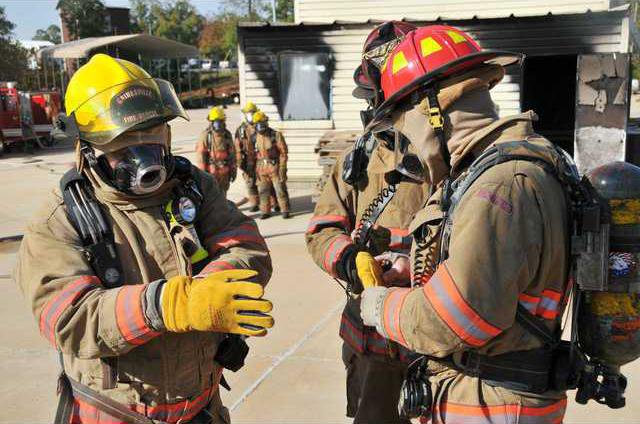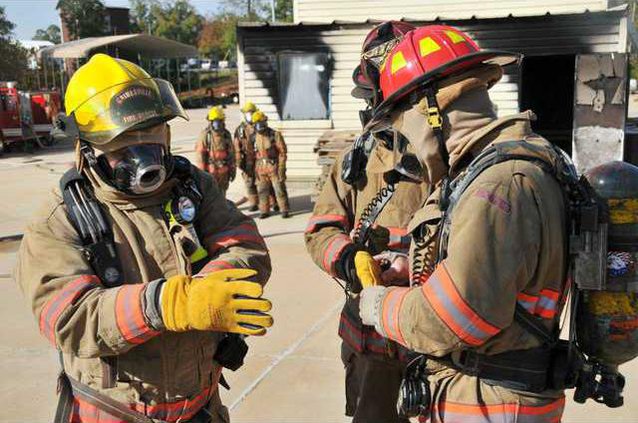George Wangemann knows what it takes to be a firefighter.
Wangemann, a member of the Gainesville City Council for 26 years, gained full appreciation for what the city's fire officials do on a daily basis when he donned a suit and walked into a burning building Tuesday.
He joined four Gainesville Fire Department recruits as they trained to fill four vacancies on the city's staff. At the Hall County Fire Services Training Center on Allen Creek Road, firefighters work with real fire as they test different scenarios with smoke, flames and victims.
"I'm proud of each one of these guys. They definitely know what they're doing," Wangemann said after several scenarios in the building. "I followed their lead and was able to safely negotiate the fire training tower. I feel better now about the good response times in the city and that they have four firefighters per truck to keep on top of things."
In 2009, the city accepted a federal Staffing for Adequate Fire and Emergency Responder grant, which allowed the department to hire 18 new firefighters.
The grant required that the city maintain a certain level of staffing for the fire department, which led to a millage rate increase to accommodate the extra staff.
The council held three public hearings about the proposed budget changes in May and June, and Wangemann expressed his opposition to the millage rate increase, which tacked on $26 per $100,000 of property in bills that will arrive this week.
"My opposition to the increase has nothing to do with my support of the fire department," Wangemann said at a June meeting. "I said (in 2009) that I did not support (accepting) the grant because of the possibility of a tax increase."
That's one of the reasons why Wangemann decided to risk his safety and step into a full firefighter's uniform.
"I did this to gain a greater appreciation for what firefighters do and what they have to go through," he said. "I learned that fire is extremely hot. I knew that it was but never had a clue that it could be so hot on the whole body. I followed the safety rules, and I came out alive."
In one scenario, fire safety leaders lit a pile of hay and wood pallets on fire to demonstrate how smoke fills a room and heats it higher than 1,000 degrees. They then doused the flames slightly to create smoke and low visibility.
"Breathing air out of the mask becomes second nature, but if you're not used to it, you're thinking it's not enough air to breathe," Sgt. Dale Perry, the fire department's training officer, told Wangemann before the training started. "Searching a home without sight is also extremely difficult. You think you know your house, but if you go into the hall one night, close your eyes, turn around three times to disorient yourself and try to find the front door, you'll probably walk into several rooms before you make it there."
On the second floor of the building, firefighters had to maneuver the heavy water hose up stairs and around corners, feeling their way along the walls while searching for injured people. A dummy called out, "Help! Help! Find my baby please."
Teamed with the four recruits, Wangemann entered the scenarios as the second or third person on the hose.
The four men have been training since July 5 and have two more weeks to go. This week will show that they can survive beginner and advanced fire situations, which will determine whether they can join the team.
"This group is doing well," Canada said. "They gel as a team, and that's the one thing we tell them from the start. This job isn't individual, and they must work together. This week is a strenuous, non-stop environment like a fire scene, and if they make it, they'll start taking on shifts at the fire stations in the next few weeks."
City Manager Kip Padgett and Assistant City Manager Angela Sheppard cheered Wangemann through the exercises, making jokes about what kind of barbecue sauce he likes and whether he felt "medium rare" or "well done."
After the scenarios, fire safety officials checked Wangemann's vital signs and took his blood pressure, and he was within expected range for the exertion.
Wangemann said he was short of breath after leaving the smoke-filled building but otherwise felt fine.
"I was nervous and anxious because fire isn't something that anybody should play with," Wangemann said. "But I put my trust in their hands and came out alive. That demonstrates they know what they're doing and are men who are well-trained. The citizens of Gainesville can be proud of them for that."

